In honor of Black Music Month, the Birmingham Times is highlighting some of the great groups across several genres. The series began June 2, with soul groups and continues today with gospel groups. The lineup for the rest of the month:
- June 16: Hip-hop groups
- June 23: Jazz groups
Gospel music—with roots in the African-American religious experience and the black oral tradition—can be traced to the early 17th century. The repetition of the words allowed those who could not read the opportunity to participate in worship. During this time, hymns and sacred songs used the same call-and-response style from which Negro spirituals and work songs emerged.
Here are some of the groups that have left a lasting impact on the gospel-music genre.
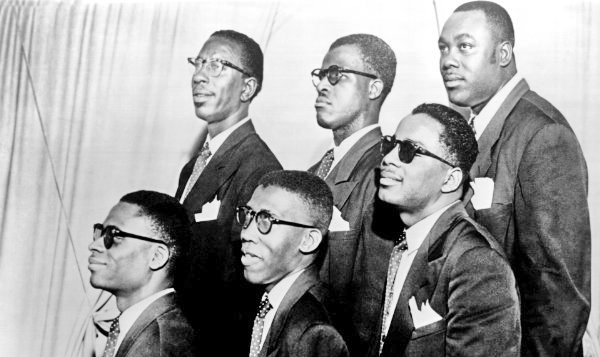
Five Blind Boys of Alabama (above)
It’s almost unbelievable that a group of blind, African-American singers—who started out touring during a time of whites-only bathrooms, restaurants, and hotels—would go on to win five Grammy awards and a Lifetime Achievement Grammy, as well as be inducted into the Gospel Music Hall of Fame and perform at the White House for three different presidents. Since the original members first sang together as kids at the Alabama Institute for the Negro Blind in the late 1930s, the band has persevered through seven decades to become one of the most recognized and decorated music groups in the world.
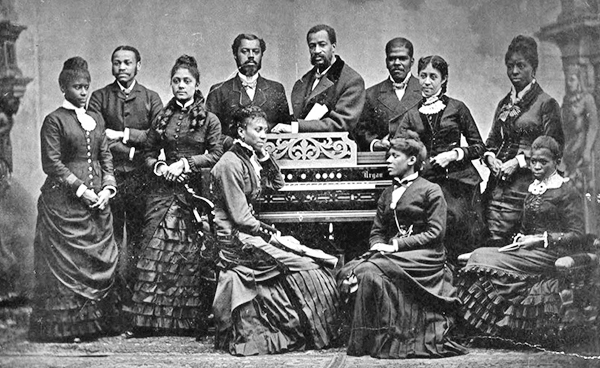
Fisk Jubilee Singers (above)
The original Jubilee Singers introduced so-called slave songs to the world in 1871, and they were instrumental in preserving the unique American musical tradition known today as Negro spirituals. They broke racial barriers in the United States and abroad, even entertaining kings and queens in Europe in the late 19th century. In July 2007, the Fisk Jubilee Singers went on a sacred journey to Ghana at the invitation of the U.S. Embassy. In 2008, the Fisk Jubilee Singers received the National Medal of Arts, the nation’s highest honor for artists and patrons of the arts. The award was presented by President George W. Bush and first lady Laura Bush during a ceremony at the White House.
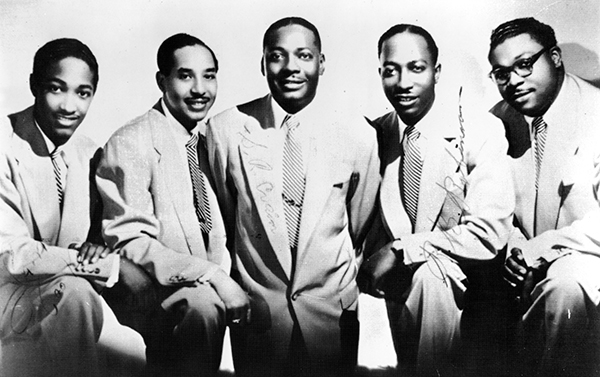
Soul Stirrers (above)
This group launched the career of legendary soul singer Sam Cooke—but they were much more than that. The Soul Stirrers set the pace for gospel and pop vocal groups and played a role as forefathers in the development of rhythm and blues. They also took gospel out of local churches and presented it to a national audience. The Soul Stirrers radically reshaped traditional gospel material and wrote many enduring songs of their own. The music of the Soul Stirrers represented a progression from jubilee singing to a more rhythmic style, and it served as the basis for doo-wop and R&B. The group attained peak popularity when Cooke, with his irresistible voice and magnetic personality, was part of the lineup.
The Caravans (above)
From the late-50s to the mid-60s, the Caravans went unrivaled as the nation’s most popular touring gospel group, earning acclaim as one of the greatest acts ever to arrive on the spiritual music front. The fluctuating roster would eventually include future superstars Shirley Caesar, Inez Andrews, Bessie Griffin, and the Rev. James Cleveland. The Caravans were formed in Chicago in 1952 by Albertina Walker, and from day one the lineup shifted regularly, with Walker as the mainstay. By the mid-50s, the Caravans were among the most popular acts in all of gospel music, with a lineup featuring the young soprano phenom Caesar and the shrieking contralto Andrews, which proved to be a powerhouse one-two punch.
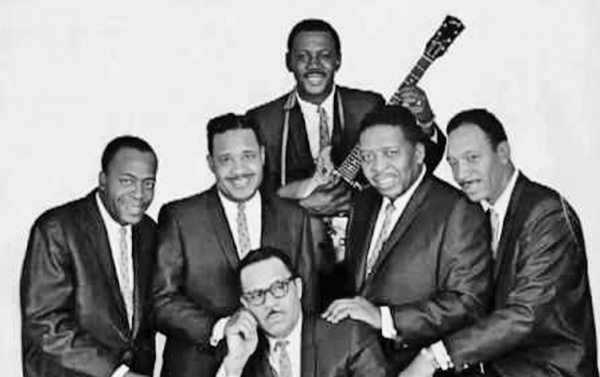
The Dixie Hummingbirds(above)
A pioneering force behind the evolution of the modern gospel quartet sound, the Dixie Hummingbirds were among the longest-lived and most successful groups of their era. Renowned for their imaginative arrangements, progressive harmonies, and all-around versatility, the group earned almost universal recognition as the greatest Southern quartet of their generation. Formed in Greenville, S.C., the Dixie Hummingbirds began their career during the late-30s as a jubilee-style act. Their lasting appeal was evident decades later when in 1973 the group backed Paul Simon on his pop smash “Loves Me Like a Rock.” In 1978, Ebony magazine named them the World’s Greatest Gospel Group.
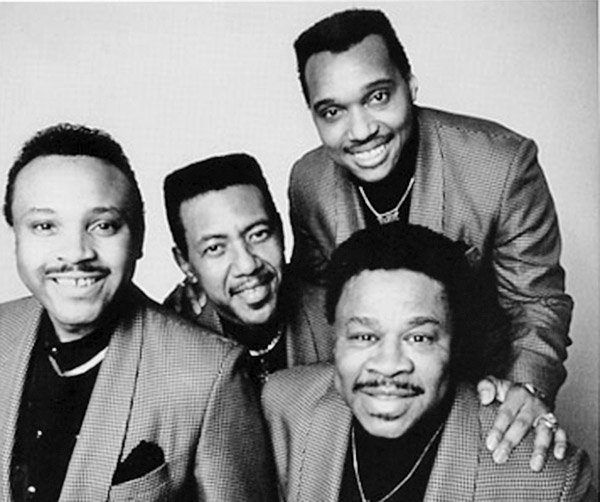
The Mighty Clouds of Joy (above)
The founder of this group, Willie Joe Ligon, was born in Troy, Ala. They were one of the first gospel groups to incorporate R&B techniques, such as drums and stylized choreography. Known as the “Temptations of Gospel,” the Mighty Clouds of Joy, like the Motown group, exhibit a sophisticated masculine style. Along with preaching, the Mighty Clouds of Joy put other innovations into their dramatic stage shows. Sporting bright, color-coordinated suits and pompadour haircuts, the group would whip audiences into a frenzy with moral tales exhorting the people to strengthen their faith. Their exuberant inventiveness alienated some conservative gospel listeners, but the group believed that through the commercial market they could reach a whole new audience—especially young people in the ’hood, who they felt needed to hear gospel’s message. The group recorded more than 30 albums in their 40 years of gospel.
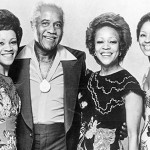
The Staple Singers (above)
One of the greatest R&B groups of all time or one of the greatest gospel groups? We say both. Last week, the Staple Singers appeared on our 12 of the Greatest Soul Groups list—and they’re back again this week. There has to be a place on our list for a group called “God’s greatest hit-makers.” In regards to their crossover from pure gospel to folk and soul-flavored material, a source of controversy within the religious community, patriarch Roebuck “Pops” Staples told Essence magazine: “We’ve always tried to make affirmative, happy music that makes a positive point. Our aim is to get across a message while we’re entertaining people.”
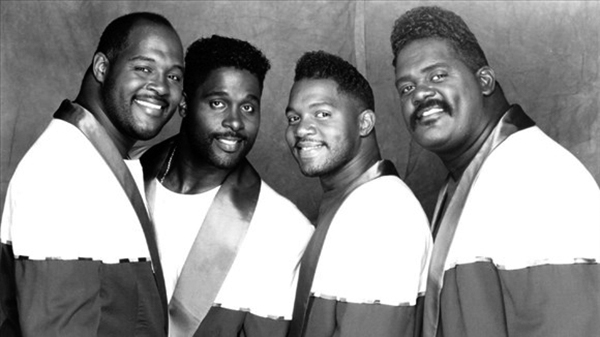
The Winans (above)
The Winans—brothers Marvin, Carvin, Ronald, and Michael—were four of 10 children born to David “Pops” and Delores “Mom” Winans in Detroit, Mich. The brothers, raised with their siblings in a strict, loving Christian environment, grew up singing in gospel choirs and eventually decided to form a professional quartet. The Winans were pioneers in the field of contemporary gospel, updating the sound and style of traditional black gospel vocal groups for the urban contemporary age. For the Winans, performing was a family affair: Their parents recorded together as Mom & Pop Winans, and other spinoff acts included Daniel Winans and Vickie Winans, as well as brother and sister BeBe & CeCe and the youngest siblings, Angie & Debbie. Even the third generation got into the act with the Winans Phase 2, sons of the original group members.
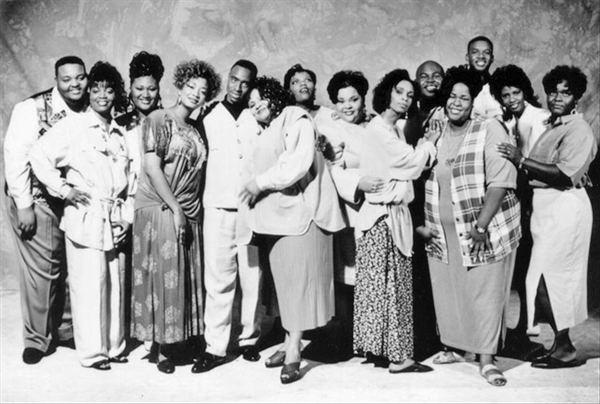
Kirk Franklin and the Family (above)
Kirk Franklin fronted three groups—the Family, God’s Property, and the One Nation Crew—before going solo, but his work with the Family (1992–2000) landed him on this list. In 1993, the group released its debut album, “Kirk Franklin & the Family,” which spent almost two years on the gospel music charts, charted on the R&B charts, and eventually earned platinum sales status. It remained at number one on the Billboard Top Gospel Albums chart for 42 weeks and was the first gospel music album to sell more than a million units. Franklin also had success with his other groups, including God’s Property, which performed the crossover hit “Stomp,” featuring Cheryl “Salt” James of the hip-hop group Salt-N-Pepa.
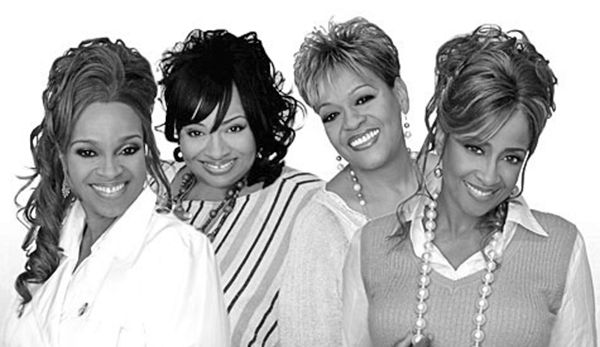
The Clark Sisters (above)
The Clark Sisters—Jacky Clark Chisholm, Elbernita “Twinkie” Clark-Terrell, Dorinda Clark-Cole, and Karen Clark Sheard—are daughters of legendary gospel musician and choral director Dr. Mattie Moss Clark. They are credited for bringing gospel music to the mainstream and considered pioneers of contemporary gospel. Their biggest crossover hits include “Is My Living in Vain?” “Hallelujah,” “He Gave Me Nothing to Lose,” “Endow Me,” “Jesus Is a Love Song,” “Pure Gold,” “Expect a Miracle,” and, of course, the crossover, gold-certified “You Brought the Sunshine.” With 16 albums to their credit and millions in sales, the Clark Sisters are the highest-selling female gospel group in history.
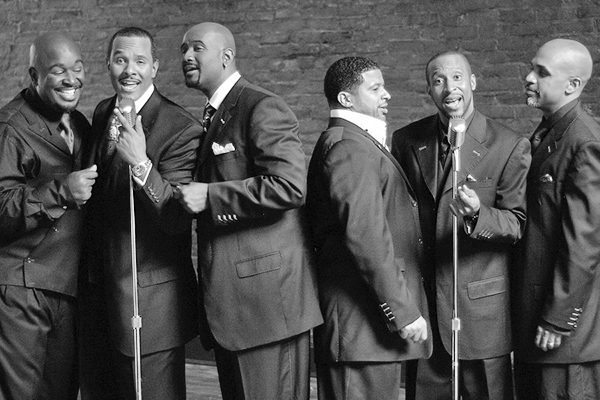
Take 6 (above)
The most Grammy-nominated group in gospel history got its start at Oakwood College (now Oakwood University), a Seventh-Day Adventist university in Huntsville, Ala. In 1980, when Claude McKnight (older brother of R&B musician Brian McKnight) was a freshman, he formed an a cappella quartet named Alliance; the group changed its name to Take 6 after a search revealed that the original name was already in use. Take 6 has performed on Saturday Night Live, at the Oscars and the Grammys—and for four sitting U.S. presidents.
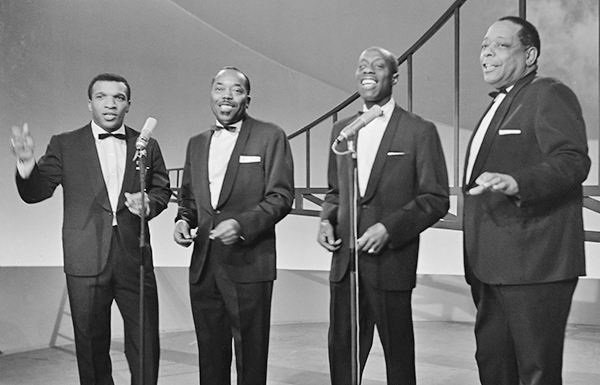
Golden Gate Quartet (above)
Speaking of presidents, the Golden Gate Quartet sang at President Franklin Delano Roosevelt’s 1941 inauguration, becoming the first black musical group to sing at Constitution Hall. They would go on to later perform several times at the White House. The group was founded as the Golden Gate Jubilee Singers in 1934 by four students at the Booker T. Washington College in Norfolk, Va. They began as a traditional jubilee quartet, combining the clever arrangements associated with barbershop quartets with rhythms borrowed from the blues and jazz-like scat singing. The quartet lost its pre-eminent position in gospel music after World War II, when they faced competition from newer hard gospel quartets, such as the Dixie Hummingbirds and the Soul Stirrers, both of whom are on this list.
(Photo credit from Archives/Getty Images)
Sources: Blindboys.com, rockhall.com, Allmusic.com, Encyclopedia.com, Fiskjubileesingers.org, fisk.edu, en.wikipedia.org




